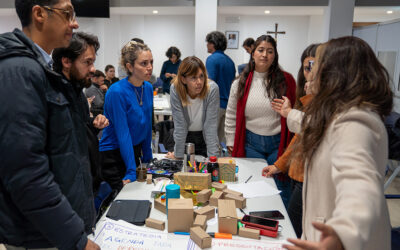Every day we see a great deal of suffering all around us and this can make us feel
overwhelmed and helpless if we do not draw upon deep human values. Sometimes, however,
the answer arrives on WhatsApp. This is whath appened to a community that tries to build
unity in a small town in Italy: “…In the hospital where I work there is a young man, a foreigner,
who is completely alone and dying. Maybe someone could spend a few minutes with him, to bring
some dignity to this situation?” This request was a shock: the responses followed quickly. The
messages from those who were with the man in his last few hours said, “At his bedside we
immediately saw that he was receiving care at the right time and that it was attentive and loving.
Really there was nothing for us to to do except be there: he was in a coma and could not benefit
from our presence.”
Was staying at the man’s bedside unnecessary and a waste of time? In those few
hours a small community, inside and outside the hospital, accompanied and brought
meaning to that situation. Who knows if a mother will be able to mourn that son in his own
country. Surely his “passing” was not in vain for those who could love that young man who
was no longer unknown. Compassion is a feeling that comes from within, from the depths
of the human heart. It makes us capable of interrupting our busy daily routine of schedules
and appointments and take the initiative to approach others and gaze at them with care,
unafraid to “touch” their wounds.
Chiara Lubich explains it with striking simplicity: “Let us imagine that we are in their
situation and treat them as we would like to be treated in their place. Are they hungry? We think – I
am hungry too. And let’s feed them. Is that person experiencing injustice? I am suffering injustice
too! And let us offer words of comfort and share their sorrows: let’s persevere until they feel
enlightened and uplifted. We will slowly see the world around us change.“ 1.
African wisdom also confirms this in a proverb from the Ivory Coast: “The person who
welcomes a stranger hosts a messenger.”
This Idea offers us a method of living out true humanism: it makes us aware of our
common humanity in which the dignity inherent in every man and woman is reflected. It
also teaches us to courageously go beyond the understanding that “closeness” is
determined by physical and cultural contexts. Thinking in this way, it is possible to expand
the boundaries of “us” to the horizon of “all” and rediscover the very foundations of social
life. When we feel we are succumbing to the impact of the suffering all around us, it is
important to draw upon the help of friends who share our views and accompany us through
life and so allow ourselves to be healed. Let’s remember, as psychiatrist-psychotherapist
Roberto Almada says, “If the good people give up the battle because of fatigue, our common
humanity will run the greatest of risks: value impoverishment.”2.
1. Chiara Lubich, The Art of Loving
2. R. Almada, Il burnout del buon samaritano, Effatà editrice, 2016
Photo: © Alexandra_Koch en Pixabay
THE IDEA OF THE MONTH is currently produced by the Focolare Movement’s “Centre for Dialogue with People of Non religious Beliefs”. It is an initiative that began in 2014 in Uruguay to share with non-believing friends the values of the Word of Life, i.e. the phrase from Scripture that members of the Movement strive to put into practice in their daily lives. Currently, THE IDEA OF THE MONTH is translated into 12 languages and distributed in more than 25 countries, with adaptations of the text according to different cultural sensitivities. dialogue4unity.focolare.org




0 Comments